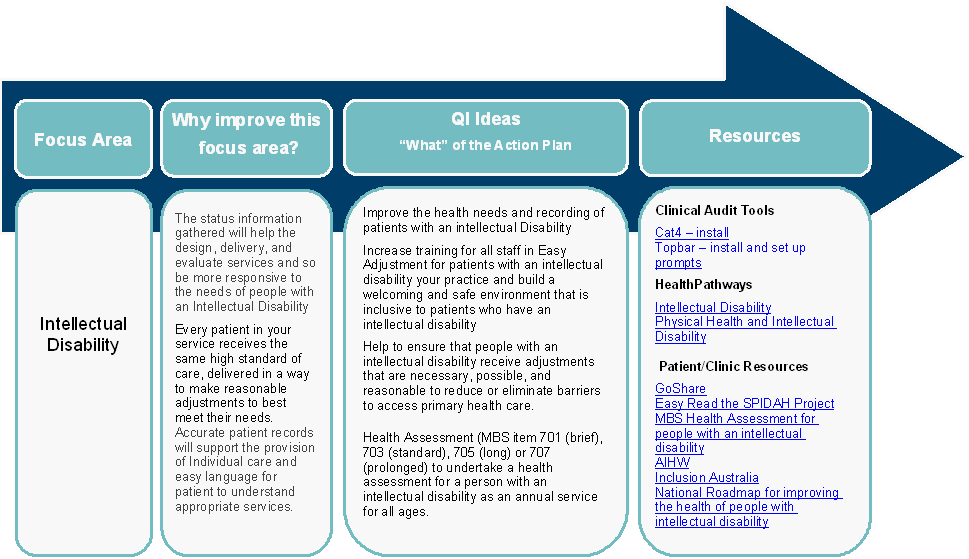People with intellectual disability can have significant healthcare needs and often multiple health conditions.
A person with intellectual disability is at high risk of poor health, chronic disease and unmanaged ill mental health.
By focusing on quality improvement activities in your practice you will be able to ensure your clinicians and practice staff are able supported and trained to offer patient-centred, comprehensive care to people with an intellectual disability.
Please feel free to download and save our templates, video’s and resources to your own clinical software and regularly review this page for any updates.

Download resource Intellectual Disability QI Change Ideas (PDF 102KB)
Frameworks – Inclusion is limitless for GP clinics, Mental Health Services and Telehealth
The following frameworks have been developed to support compliance with relevant legislations and standards for inclusive practice.
Continuous quality improvement framework towards inclusive and equitable health care (pdf 1MB)
Supporting Inclusive Practice Framework for Youth / Adult Mental Health Services (pdf 9MB)
Framework – Telehealth Peer Support Worker (pdf 2MB)
Mental Health Service Framework
Mental Health Service – Audit process outline (docx 152 KB)
Mental Health Service – Action register (docx 227KB)
Plan Do Study Act (PDSA)- Templates for Quality Improvement
Polar Walkthroughs (data cleansing in clinical software)
Polar Walkthrough – Find Uncoded diagnoses (Disability) 163KB
Polar Walkthrough – Identifying patients that are eligible for a Health Assessment MBS item (230KB)
Patient Profile Resources
About Me – Patient Profile (docx 113KB)
Emergency Information about me – Patient Profile (docx 122KB)
Dental Information About Me – Patient Profile (docx 9 MB)
Annual Health Assessment (CHAP)
Adult Comprehensive Health Assessment Program (CHAP) – Annual Health Assessment for People with Intellectual Disability.
Tool – Access the CHAP online for free from the Department of Health and Aged Care here
Using the Free CHAP Webinar (pdf 6MB)
GP Clinic CHAP letter with easy read (docx 11MB)
Video – Overarching: CHAP for people with intellectual disability
Video – How to complete Part 1 of the CHAP tool: CHAP for people with intellectual disability
Video – A GP lens on the CHAP tool
Video – Expert with lived experience talks about the CHAP tool
Information sheet – CHAP (3 pages) (pdf 361KB)
Checklist – CHAP (1 page) (pdf 79KB)
Easy read information – CHAP (7 pages) (pdf 803KB)
Diet and nutrition resources, consumer and supporter-facing
Calcium – Calcium rich foods for a healthy diet (2MB)
Fruit – Everyday is good day to have fruit (daily intake) (3MB)
Grains – What does a serve of grains look like (3MB)
Meats and alternatives – Size and serves per day (2MB)
Vegetables – Size and serves per day (3MB)
Glycaemic Index (GI) – Tips for eating food in low GI (7MB)
Healthy fats – Healthy fats for good health (3MB)
Healthy homemade Friday night swaps (4MB)
Water – The human body needs water (2MB)
Iron – Foods that have iron for a good diet (2MB)
Lower salt swaps (5MB)
Lower sugar swaps (6MB)
Perfect your portion – How much you should eat (5MB)
Webinar: The importance that food and nutrition plays in health and wellbeing
Resources developed with a focus on healthy diet, homemade alternatives and portion sizes based off the Australian Guide to Healthy Eating (AGTHE) Further information visit Victoria University CHEW program.
Podcast episodes – Health and disability
Community is Our Middle Name – Podcast
Episode Fifty: Disability, Peer Support & Telehealth
Episode Sixty: What Is Disability Pride?
Our Community Is Able – Podcast
Our Community Is Able – Trailer
VALID – Episode 1
General Practitioners Management Plan – Episode 2
Exercise Physiologist – Episode 3
Nutrition – Episode 4
Occupational Therapist – Episode 5
CHAP Tool – Episode 6
NDIS & Local Area Coordinator – Episode 7
Inclusive Practices & Reasonable Adjustments – Episode 8 (Final)
Medicare Benefits Scheme (MBS) descriptor document and resources
MBS items – People with intellectual disability (PDF 495KB)
RACGP Article New tool to help GPs with complex MBS billing
RACGP training module eLearning Program – MBS services available for patients with disability
RACGP Eligible Disability MBS Flow Chart of Services (PDF)
RACGP Article The Consumers Health Forum of Australia (CHF) calls for Medicare public education campaign
Chronic Health Care plan editable templates (easy read) and other Allied health resources
These documents are editable templates for health professionals to develop chronic health care plans using easy read formatting. These are specific for allied health professions and will assist to tailor a patient’s health plan to meet their individual needs.
Dentist health plan (Easy read template) (docx 2MB)
Diabetes Nurse health plan (Easy read template) (docx 2MB)
Dietitian health plan (Easy read template) (docx 2MB)
Podiatrist health plan (Easy read template) (docx 2MB)
Physiotherapist health plan (Easy read template) (docx 2MB)
Occupational therapist health plan (Easy read template) (docx 2MB)
Speech Pathologist health plan (Easy read template) (docx 2MB)
Exercise Physiologist health plan (Easy read template) (docx 2MB)
Tracking signs, symptoms and side effect templates
Pharmacy Medications Template (Example antipsychotic medication) (docx 1 MB)
Signs and Symptoms Tracker (docx 1 MB)
Reception staff and adding patient alerts to files
HealthPathways
HealthPathways, for clinicians, log in details required
How to use HealthPathways to care for your patients with an intellectual disability
For more information
View the Western Victoria PHN Learn, SPIDAH Education playlist on Inclusive Practice and Reasonable Adjustments (Increase your knowledge on ID) This playlist features subject matter expert presentations on a wide range of health topics in supporting people with an intellectual disability – with key learnings also applicable to many other population groups.
The SPIDAH Project further information
For any feedback on resources or documents available on this page, please contact spidah@westvicphn.com.au
